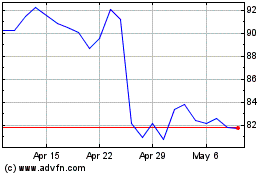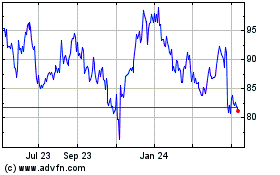FDA Panel: BioMarin Muscular Dystrophy Not Effective
November 24 2015 - 9:20PM
Dow Jones News
SILVER SPRING, Md.—A Food and Drug Administration advisory panel
concluded that a new drug from BioMarin Pharmaceutical Inc. hasn't
been proven to effectively treat the fatal disease called Duchenne
muscular dystrophy, saying studies simply didn't prove the medicine
worked in most patients.
The outside panel found that trials of the drug, called
drisapersen, fell short of proving it helped children with the
illness, which is progressive, crippling and afflicts male
children. But some panelists left open the possibility that
individual children might yet respond to the drug, despite the
overall negative finding.
"Efficacy has not been established," said Glen Nuckolls of the
National Institutes of Health. But committee Chairman G. Caleb
Alexander, an associate professor of epidemiology and medicine at
the Johns Hopkins Bloomberg School of Public Health, said, "There
was some suggestion that the drug could be helpful in some
individuals."
The FDA is expected also to consider soon a competing drug from
Sarepta Therapeutics Inc. called eteplirsen.
In Tuesday's case, the committee concluded by a vote of 15-2
that the largest trial of drisapersen—to see if it could improve
the afflicted children's ability to walk—had failed to produce any
statistically significant improvement. The study measured how far
the patients could walk in six minutes.
The federal agency isn't required to follow the advice of its
advisory panels, but generally does so.
Henry J. Fuchs, BioMarin's chief medical officer, said the drug
"is a breakthrough therapy" with "a consistent pattern of
effect."
The FDA panel's hearing and decision vividly highlight the
tension between the compassionate urge to help such patients with a
lethal disease that has no cure and the agency's need to ensure
that a new treatment actually helps and isn't mostly harmful. As
was the case with HIV drugs decades ago, patients with
life-threatening diseases and their families often are willing to
take big risks and are pressing the FDA to approve a drug with
apparently marginal effects.
The FDA staffers who evaluated the company's research signaled
they were skeptical about some of the drug's evidence of
effectiveness, and worried that its safety profile is too risky. In
a written analysis, they said, "The current thinking of the primary
review team is that evidence supporting the effectiveness of
drisapersen is inconsistent."
Duchenne muscular dystrophy is a disorder occurring in about 1
in 3,500 boys. It is often fatal by the time the boy reaches his
20s or early 30s. It is typically first noticeable in children from
3 to 5 years old, with muscle weakness becoming progressive.
Children with Duchenne begin to lose their ability to walk in their
teens, and can lose respiratory function and begin to have severe
cardiac problems.
The genetic disease is caused by a lack of a protein called
dystrophin, which results in muscle fibers that degenerate and
cause the patients to fall frequently. Muscle loss and function
loss ensue, typically leaving patients wheelchair-bound by ages 10
to 14.
There aren't any FDA-approved treatments for the disease. Such
patients often get steroid drugs like prednisone and prednisolone
to help with symptoms. But these create risks of infection,
diabetes, obesity and other conditions.
BioMarin's drug disapersen is designed to increase the
production of dystrophin, which theoretically could lead to greater
muscle strength and clinical benefit for the patients. The advisory
panel was called upon to advise the agency on the studies done so
far.
The reviewers, in looking at one small study that measured the
children's ability to walk, found that "the overall persuasiveness
of this study appears to be low." A second study came to a similar
conclusion, but a third larger study produced negative results.
Regarding safety, the federal agency's reviewers found that
"even in the context of an invariably disabling and fatal disease
such as DMD, the safety profile of drisapersen is concerning." The
FDA staffers found that the drug appears to have adverse effects on
the kidneys, skin and blood vessels.
The agency's reviewers said in studying biomarkers in the body
related to the disease, "Drisapersen has little effect on
increasing dystrophin levels, the putative mechanism of
action."
But parents who appeared at the FDA hearing talked about
children who appeared to benefit from getting the drug.
Erica Muskopf from Ohio, whose son Brody has the disease, said
that with the medicine, he is able to run and jump, whereas without
it "he could barely get off the floor." Now, she said, "Brody has
gone almost two months without a fall."
Write to Thomas M. Burton at tom.burton@wsj.com
Subscribe to WSJ: http://online.wsj.com?mod=djnwires
(END) Dow Jones Newswires
November 24, 2015 21:05 ET (02:05 GMT)
Copyright (c) 2015 Dow Jones & Company, Inc.
BioMarin Pharmaceutical (NASDAQ:BMRN)
Historical Stock Chart
From Mar 2024 to Apr 2024

BioMarin Pharmaceutical (NASDAQ:BMRN)
Historical Stock Chart
From Apr 2023 to Apr 2024
